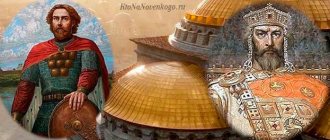- Esoterics and Orthodoxy Alexey Yarasov
- Esotericism Coelho: burn the books of the cult author? priest Alexander Ermolin
- From the darkness of esotericism to the light of the Gospel (testimony) Oleg
- Signs of religious movements of the occult, esoteric and pseudoscientific orientation of the priest. Andrey Khvylya-Olinter
- Religion and esotericism V. Lebedev
- Esoterics Deacon Andrey
***
Esoterics, esotericism ( from of people. Knowledge gained through esoteric experiences is extremely subjective, therefore esoteric teachings differ from each other.
***
What is the relationship between esotericism and science?
Modern esotericism often appears in a scientific guise and appeals to science, proclaiming the principle of the unity of science, religion and philosophy. However, in reality, the connection between science and esotericism is not obvious. The scientific picture of the world is fundamentally different from the esoteric picture of the world: esoteric ideas on the fundamental problems of the origin of the world, life, man, cosmology, biology, paleontology and other sciences are in conflict with scientific data. Unlike science, esotericism does not search for a solution to a problem, but offers answers initially, and the method of esotericism is not scientifically reproducible and cannot be rationally proven.
Ancient roots
Some modern scientists[ who?
] it is believed that in the early stages of Christianity the core of oral teaching was inherited from Palestinian and Hellenistic Judaism, which formed the basis of a secret oral tradition, in the 4th century called
the disciplina arcani
, which mainstream theologians believe is contained only in parts of the liturgy and in some other traditions that remain parts of some branches of mainstream Christianity (for example, the doctrine of transubstantiation is believed by Catholic theologians to have been part of
the disciplina arcani
).
Esotericists are sure that disciplina arcani
, practiced in early Christianity, was a kind of secret, esoteric teaching that differed from the explicit teaching.
However, in the Christian understanding the term disciplina arcani
has a different, rather narrow meaning. For example, according to the Orthodox Encyclopedia:
Disciplina arcani (less commonly arcana; lat. - secret teaching), modern. a term meaning the rule of the ancient Church not to allow the presence of unbaptized people (including catechumens) during the celebration of the sacraments - primarily Baptism and the Eucharist. D. a. implied a ban on disclosing the order of the sacraments and their meaning, as well as the exact wording of the baptismal Creed and the Lord’s Prayer before the person wishing to be baptized entered the category of “those entering enlightenment.”
Indeed, the announcement procedure in the first centuries was carried out in secrecy. Georgy Florovsky points out, however, that the secret did not relate to teaching, but to formulas and rituals and had rather a pedagogical meaning:
And therefore, the Symbol communicated and explained at this time must be “inscribed in memory in the heart,” repeated orally, without writing it down on paper, and read secretly, so that no one overhears. This disciplina arcani, spreading in the Church, especially in the 4th century, has a pastoral and pedagogical meaning and may reflect the Alexandrian theory of the degrees of knowledge. It is possible that it also reflected the practice of ancient pagan mysteries... It relates not so much to teaching as to formulas and rituals.
Tertullian wrote about the forced concealment of information about Christian worship in everyday life due to misunderstanding and ridicule on the part of the pagans; at the same time, the pagans still knew what was happening in the Church.
Academician S. S. Averintsev, a prominent specialist in antiquity and Christian history, pointed out a fundamentally different meaning of the phenomenon of disciplina arcani
in early Christianity compared to the esotericism of the Gnostics or Freemasons:
Generally speaking, any religious and especially mystical consciousness is forced to create for itself a system of sacred signs and symbols, without which it could not describe its “ineffable” content; <…>this is as inherent in Byzantine theology as in Taoist, or Buddhist, or Hindu mysticism.
If we keep in mind only this universality of symbolic language, it is easy to overlook the essential difference between historical types and “styles” of symbolism. Therefore, we emphasize that for the Christian tradition the most important emphasis lies <...> not on but a hint of what is hidden from the uninitiated
(cf. the role of the symbolism of the mystery and Gnostic communities from Eleusis to modern European Freemasonry). Of course, elements of both can be easily identified in the complex composition of the Christian tradition (early Christian “disciplina arcani”<…>), but their modality within Christian symbolism as a whole is each time determined by the central aspect of this whole: the sacred sign and symbol is a sign , requiring faith. <…>
The “secret” expressed in the sacred sign is in the Christian system of ideas not so much the esoteric property of the few, saved from the crowd, as a military secret, saved from enemies
.
<…> The place of the mysterial-gnostic opposition initiated/uninitiated
is taken by a completely different opposition
comrades/opponents
; the latter includes “visible and invisible enemies” - people and demons.
Some modern trends of esoteric Christianity
turn to the writings of Origen (as well as to other church fathers and biblical commentaries) to establish ideas of reincarnation as part of the Christian tradition, although Origen clearly denies reincarnation in Against Celsus and his other works.
Did Jesus Christ say anything about esotericism?
The Lord warned us that we live in a time when “many false prophets have gone out into the world (1 John 4:1), who come to us “in sheep’s clothing, but inwardly they are ravenous wolves” (Matthew 7:15). Our relationship with God is a relationship with the Father, who loves his children infinitely. And esotericism cannot comprehend this; such a connection is unthinkable for them. Magic and esotericism offer a mechanical scheme: I perform some action, say some words and automatically get the result. There is no place for God as a Person here.
New time
The movements of medieval Western esotericism, such as alchemy and astrology, combined Christian theology and doctrines of esoteric content.
In his Apology
Pico della Mirandola (Apologia J. Pici Mirandolani, Concordiae comitis, published 1489) states that there are two types of “magic”: theurgy (divine magic) and goetia (demonic magic).
These disciplines were called the " Operation of the Stars
", while alchemy was the "
Operation of the Sun
" and astrology the "
Operation of the Moon
".
All of them are classified as active, or “operational” disciplines, as is Kabbalah. Representatives of esoteric Christianity
can practice all these movements, or traditions, and become adepts, alchemists, astrologers, and
hermetic cabalists
, but nevertheless there are esoteric Christians who practice only passive, or contemplative disciplines, which help them to better comprehend the “secret knowledge” ", received from the Supreme Beings.
In the 16th and 17th centuries, this trend was brought to its logically completed form by the development of Theosophy and Rosicrucianism. The Behmenist movement and Freemasonry also actively developed at this time.
What is the relationship between esotericism and Christianity?
Despite the statement of some esotericists about the relationship of esotericism with Orthodoxy, Orthodox Christians have a negative attitude towards attempts to combine Orthodoxy and esoteric practices. In esotericism there is no teaching about the moral path and ethical values, which is why it is used as a tool for the survival of some at the expense of others and can be a metaphysical basis for modern totalitarian regimes and sects to establish spiritual domination. Esotericists claim to possess a “hidden”, “true” understanding of Christianity, accessible, in their opinion, only to a narrow circle of “enlightened”, “initiated” and highly educated people. In addition, pseudo-Christian esoteric teachings have such common features as heretical theology, the use of not only the canonical Gospels, but also the apocrypha, which are often preferred to the canonical Gospels, as well as the belief that there is some oral tradition emanating from the twelve apostles, which contains "esoteric teaching" of Jesus Christ. In Orthodoxy, and Christianity in general, there is no esoteric teaching, thus the term “esoteric Christianity” is not accepted or used by Christians.
Mystical religion
Early Christians used the word in Greek. μυστήριον (mysteries) to designate the sacraments of the Christian church. In the Old Testament, the word "mysterion" is equivalent to the Hebrew sôd, "mystery" (Prov. 20:19; Judith 2:2; Sir. 22:27; 2 Macc. 13:21).
In the New Testament the word sacrament
usually applied to the sublime revelation of the Gospel (Matthew 13:11; Colossians 2:2; 1 Timothy 3:9; 1 Corinthians 15:51), the incarnation and life of the Savior and His manifestation in the preaching of the apostles (Romans 14 :24; Ephesians 3:4; 6:19; Colossians 1:26; 4:3).
Theologians call a sacrament
the revelation of truths that surpass the natural mind, since, in the narrow sense, a sacrament is a truth that surpasses the created intellect.
Inability to achieve understanding of the sacrament
in a rational way leads, according to occultists, to the internal or hidden way of understanding the Christian sacraments, which is called esoteric in
esoteric Christianity
.
Esotericists believe that even when open and in the presence of faith, the sacraments still remain unclear and hidden while mortal life lasts, unless understanding of the sacraments is made possible with the help of esotericism.
How should one treat esotericists?
“We call on all members of the Church to pray for the enlightenment of those obsessed with false teachings and to firmly preserve what has been handed down to us, “turning away from worthless idle talk and the contradiction of false knowledge” (1 Tim. 6:20),” says the Definition of the Council of Bishops in 1994 “On pseudo-Christian sects, neopaganism and occultism."
See also: OCCULTISM, MAGIC, WITCHRY, WITCHRY, DIVINATION.
Modern forms
Many modern movements of esoteric Christianity
accept the idea of reincarnation, as well as the complex energetic structure of the human being (such as the etheric body, astral body, mental body and causal body). These movements emphasize the need for internal spiritual work, which will lead to the renewal of man in the Pavlovian sense. Rudolf Steiner and Max Handel published several spiritual exercises in their writings to help develop followers. The works of Tommaso Palamidessi, whose goal was the development of ascetic techniques and meditations, were written in the same vein.
George Gurdjieff called his teaching the “Fourth Way” - the path of consciousness on which the student learned to work with the negative sides and suffering of his ordinary life and transform them in order to come to true life (“Life is only life when I Am.”) According to everyone to these esoteric scientists, the combination of these methods (often associated with such eastern methods of meditation as chakra meditation or visualization) will lead to the salvation of the soul and to the complete rebirth of man. This process often implies the existence of a spiritual body prone to resurrection (and therefore called the Resurrection Body in Christian terminology). Some esoteric Christians
today they incorporate into their beliefs the techniques of traditional magical practices such as Kabbalah, theurgy, goetia, alchemy, astrology and Hermeticism.
The Bible condemns witchcraft
The relationship of a believer with magic is not directly and thoroughly dealt with in the Bible, but it is often mentioned in passing in a negative way and with a strict prohibition:
“The works of the flesh are known; they are: adultery, fornication, uncleanness, lasciviousness, idolatry, sorcery, enmity, quarrels, envy, anger, strife, disagreements, (temptations), heresies, ... "
(Gal.5:19, 20)
“Do not eat with blood; don’t tell fortunes or tell fortunes.”
(Lev.19:26)
“You shall not have anyone who leads his son or daughter through fire, a soothsayer, a fortuneteller, a sorcerer, a sorcerer, ...”
(Deut. 18:10)
“And quite a few of those who practiced sorcery, having collected their books, burned them in front of everyone, and added up their prices, and they turned out to be fifty thousand [drachmas].”
(Acts 19:19)
“Don’t leave the witches alive.”
(Exodus 22:18)
“I will pluck out sorcery from your hand, and you will have no one who reads the clouds.”
(Mic. 5:12)
“And when Joram saw Jehu, he said, Is Jehu at peace? And he said, “What peace can there be with the fornication of Jezebel your mother, and with her many sorceries?”
(2 Kings 9:22)
In the Middle Ages, radical methods were used to combat sorcerers; today everyone is responsible for their choice only before God









